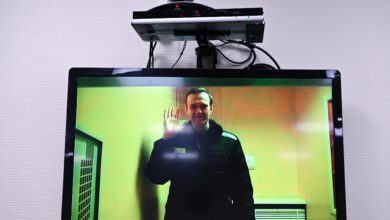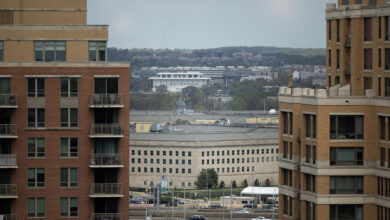While Egyptians celebrate after breaking into state security buildings all over the country and publishing the captured documents on social networks, doubts are rising about the significance of the leakage.
Some are even worried that it might have been partially orchestrated or permitted by state security itself in order to distract public attention and stain reputations of opposition figures.
The break-ins began in Alexandria when thousands of locals stormed the a state security building Friday night. After discovering that documents were being shredded, protesters entered the building to protect the rest of the material and hand it over to the army’s protection.
Similar scenes replayed themselves recently in state security buildings in 6 October, Menufeya, Aswan, Sinai and most significantly, state security headquarters in Nasr City.
The raids led to the acquisition of enormous quantities of classified material, most of which was handed over to the attorney general and the armed forces for investigation while some ended up in the possession of civilians who managed to sneak them out of the ransacked structures.
State security officers were discovered destroying and smuggling material, the result of which over 50 officers were imprisoned. The officers currently await investigation.
Many believe that the uncovered material is merely the tip of the iceberg.
A lawyer for the Muslim Brotherhood, Abdel Moneim Abdel Maksoud has extensive experience dealing with state security. He believes that state security expected the raids and prepared for it by destroying all incriminating material before protesters accessed the buildings.
“Even though a lot of documents that uncover secrets and violations were found, they are nothing in comparison with what was hidden and burnt,” says Abdel Maksoud.
Activist George Ishak, one of the people who the leaked documents, believes that the fact that protesters were able to access the buildings relatively easily, while they were arrested when attempting to enter the building in Lazoghly on Sunday, shows that all the important material is kept in Lazoghly, while the material captured so far is less important.
“They must have taken precautions as soon as there was talk that people were planning to raid the buildings; they’re not going to wait until people are there,” says Ishak.
Fouad Allam, former deputy of state security, denies that state security destroyed documents. He says that state security’s archives are available and can be accessed by the general attorney at any time.
The nature of some of the leaked material reinforces suspicions that state security manipulated the leakage. Some documents reveal cooperation of public figures and media people with state security while others reveal their involvement in bribery and other forms of corruption.
Emad Gad, a political analyst with Al-Ahram Center for Political and Strategic Studies, believes that state security could benefit from publishing material incriminating respected public figures and media personalities.
“The documents could ignite disputes and call everybody’s honesty into question, thereby creating confusion that would take attention off other issues.”
Gad believes that public calls to start investigating the material found could be used to the advantage of state security by taking attention away from ongoing investigations of former officials.
“State security has a diabolic way of thinking, so anything can be expected,” says Gad.
Abdel Maksoud believes that state security could have planted some documents in the buildings “to create confusion and give misleading impressions about certain people.”
Nevertheless, many call for Egyptians not to take for granted the veracity of the information contained in the documents.
Mahmoud al-Khodeiry, vice president of the appeals court and former head of the judges club, called on people to employ “caution” in dealing with the documents.
“I urge the people not to get carried away with their suspicions. The information is subject to investigation; it isn’t to be treated as fact,” says Khodeiry. He added that the state security officers who prepared the documents are of questionable integrity and hence, their reports should not be trusted.
A middle-ranking officer in state security, who requested anonymity, confirms Khodeiry and Gad’s doubts about the authenticity of the information. He told Al-Masry Al-Youm that all the critical folders were transferred out of the Nasr City headquarters Friday night and Saturday morning before they were raided by protesters Saturday night. He said that the files are kept in hidden locations.
“The documents that were found are not important to us, but they are considered important for people,” said the officer. He explained that the documents found were left on purpose to satisfy the protesters who would have been enraged if they found the buildings empty.
Beyond the leaks, many believe that the most effective steps to repair state security have yet to be adopted.
Ayman Nour, head of the liberal Ghad Party, suggests transforming state security into an information body designed for fighting terrorism and independent from the Ministry of Interior. He adds that the people working in the apparatus need to undergo psychological rehabilitation.
“What’s happening is an attempt to reveal the symptoms of the disease, but the disease is still there. State security is still an apparatus that works without limits to its power; it was ruling Egypt,” says Nour.
Nevertheless, the documents found, albeit widely considered insignificant, may be able to corroborate other evidence of the regime’s behavior.
“This regime that we’ve feared turned out to be fragile. What made it strong was the people’s weakness,” says Gad.




